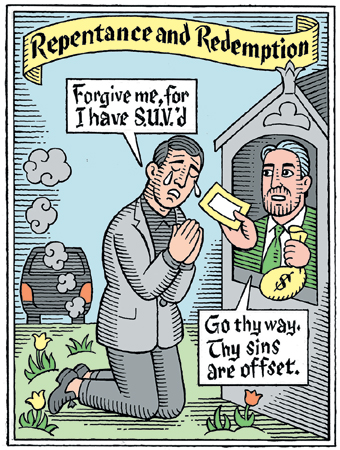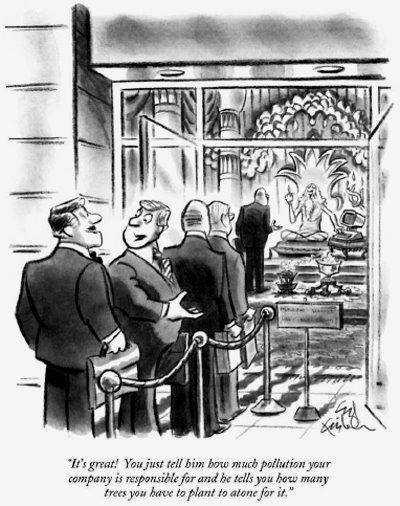I know that many out there will find the idea of a blogging Polar Bear quite ridiculous , and some many will also think I don’t have the appropriate credentials to hear confessions of so-called “carbon sin.” Fair enough, but everything must start somewhere.
So I’d be interested in your thoughts are about the idea of "carbon sin" and our shared spiritual or social responsibility for protecting the environment. Some may think these ideas are completely bogus, but from where I sit, it seems like an elementary matter of decent behavior and social justice. You humans have so many different faiths and ideologies that it's difficult for a bear of little brain to sort it all out.
However, as I surf the web from my outpost here along the Artic Sea, I’ve run across quite a few good web sites that provide useful information about the theology of conservation and environmental stewardship. While I haven’t found many sources that specifically discuss “carbon sin,” the idea seems entirely consistent with many religious. spiritual and secular traditions. And I believe it's fair to say that regardless of spiritual belief, as a normative matter, we live here on earth as part of a community, with mutual obligations and responsibilities to each other.
As pointed out in the Guardian last April:
Most of the world's mainstream faiths have at their core a deep respect for nature, but over hundreds of years many have developed an ambivalent attitude towards ecology and the pressures put on the earth by humans. Church leaders have largely stayed silent on the extinction of species and natural capital and have concentrated their ethical teachings on the need to relieve human poverty. But the reality of impending climate change and the effects it will have on the poor is concentrating minds and causing many to fundamentally reassess their understanding of man's place in the world.As long ago as 2001, the US Catholic Bishops spoke out strongly about the need to address global climate change.
“{A}t its core, global climate change is not simply about economic theory or political platforms, nor about partisan advantage or interest group pressures. Rather, global climate change is about the future of God’s creation and the one human family. It is about protecting both the ‘human environment’ and the natural environment. It is about our human stewardship of God’s creation and our responsibility to those generations who will succeed us…. As people of faith, we believe that the atmosphere that supports life on earth is a God-given gift, one we must respect and protect. It unites us as one human family. If we harm the atmosphere, we dishonor our Creator and the gift of creation.” (Global Climate Change: A Plea for Dialogue, Prudence and the Common Good, U.S. Catholic Bishops, 2001)
Testimony from the US Catholic Conference from last June to the Congress squarely makes the case for a fundamental change in direction in U.S. policy. In their statement, the bishops emphasize that rich countries should take the lead, out of concern for protecting both the environment, and for protecting the interests of poor and low-income people around the planet, whose lives will be disrupted also by climate change.
According to John Carr, Secretary of the Department of Social Development and World Peace for the US Conference of Catholic Bishops, there is a “moral responsibility to care for creation” -- which I assume includes polar bears like me.
The religious leaders here today share an abiding love for God’s gift of creation and the biblical mandate and moral responsibility to care for creation. As people of faith, we are convinced that “the earth is the Lord’s and all it holds.” (PS 24:1) Our Creator has given us the gift of creation: the air we breathe, the water that sustains life, the climate and environment we share--all of which God created and found “very good.” (GEN: 1:31) We believe our response to global climate change is a sign of our respect for God’s creation and moral measure of our nation’s leadership and stewardship.A useful web site on environmental stewardship for those in the Catholic tradition is the Catholic Conservation Center, which is chock full of references to church teachings regarding conservation and the Environment.
Sister Marjorie Keenan , RSHM, in her essary "From the Garden to the City," explains that the basis for environmental stewardship is spelled out in the Catechism of the Catholic Church.
Again and again, the Catechism reminds us that creation is good, calling it a serious mistake to deny it. Creation shares in the very goodness of God. It is a gift, an inheritance entrusted to our care [299]. To care for creation, we must respect the particular goodness of every creature and avoid "any disordered use of things that would be in contempt of the Creator and would bring disastrous consequences for human beings and their environment" [339].In his essay, Catholicism and the Natural World, which appeared in The Catholic Faith 5, no. 6 (November/December 1999), Thomas Storck explains the relationship between sin and environmental stewardship. The passage is worth quoting at length, because of what it says about unbridled consumerism vis a vis the environment.
As Catholics we must try to make our attitude toward our fellow creatures that of Holy Scripture, which eloquently speaks of animals, plants and even ice and snow or clouds and lightning, as praising God simply by their existence.
"God wills the interdependence of creatures. The sun and the moon, the cedar and the little flower, the eagle and the sparrow: the spectacle of their countless diversities and inequalities tells us that no creature is self-sufficient. Creatures exist only in dependence on each other, to complete each other, in the service of each other. "(340)
The system of “interdependence of creatures” is what we generally call nature. Nature is simply the system of natures. Each created thing, sun and moon, large tree and little flower, has what we call a nature, that is, a whatness: each is a distinct and different kind of thing. As we saw above, it is by being itself in its own integrity that a thing is good. But none of these individual goods exists entirely by or for itself, “no creature is self-sufficient.” Thus even though all created thing praises God simply by existing, they also exist “in the service of each other.” Plants make use of the sun, rain and minerals from the soil; animals eat plants and other animals and
use wood or grass or sand to make nests or other dwellings. So while it is good to allow animals and plants to live their own life, for of themselves they praise God, it is also good to cut down trees to construct buildings needed for mankind's use or to eat plants and animals, since they exist also to serve us and each other.
According to the Deistic concept of creation, created things would exist solely for our use, and even for our misuse. But since each created thing praises God by being itself, we cannot use them except in our genuine service and for our genuine welfare. It is as if we employed a servant who, whenever he was not actually serving us, spent His time worshipping before the Blessed Sacrament. Would we dare call him from this holy work to help us in something immoral or even frivolous? We can consider our use of the natural world analogously. Since each created thing blesses and praises God in its natural state, simply by existing, we ought not to take away that
praise from God unless we have good reason.For natural things are not simply at our disposal, but exist “to complete each other, in the service of each other.” If we use them for frivolous reasons, or for things which ultimately are harmful to human society, then we are not using them in our service, but to our hurt. The mere piling up of consumer goods, the spending of huge sums on unworthy objects, our insatiable appetite for amusements — are any of these sufficiently important to justify our taking away things of the natural order from their work of praising God?
As Pope John Paul 11 wrote in Centesimus Annus: "It is not wrong to want to live better; what is wrong is a style of life which is presumed to be better when it is directed towards “having” rather than “being,” and which wants to have more, not in order to be more but in order to spend life in enjoyment as an end in itself." (no.36)
The gravity of sin involved in misusing natural objects doubtless depends on many factors, but one can hardly deny the existence of some sin.
Pope Benedict has spoken strongly in favor of environmental stewardship. At a Vatican conference on climate change last April, Pope Benedict XVI urged bishops, scientists and politicians to "respect Creation" while "focusing on the needs of sustainable development, according to the Guardian, "Protect God's creation: Vatican issues new green message for world's Catholics," 04-27-07.
The Pope's message followed a series of increasingly strong statements about climate change and the environment, including a warning earlier this year that "disregard for the environment always harms human coexistence and vice versa.”
More recently, in December, 2007, however, the pope criticized those who he thinks may be overly zealous about global warming.
“We need to care for the environment. It has been entrusted to men and women to be protected and cultivated with responsible freedom, with the good of all as a constant guiding criterion. .."
So far, so good. However, the Pope also said:
“...Human beings, obviously, are of supreme worth vis-à-vis creation as a whole. respecting the environment does not mean considering material or animal nature more important than man... It is important for assessments in this regard to be carried out prudently, in dialogue with experts and people of wisdom, uninhibited by ideological pressure to draw hasty conclusions, and above all with the aim of reaching agreement on a model of sustainable development capable of ensuring the well-being of all while respecting environmental balances.”
See: The Pope condemns the climate change prophets of doom – Daily Mail, 12-13-07.
I have no beef about “prudence” when it comes out to carrying out environmental assessments.
And I sure don't consider myself a “prophet of doom.” But I am highly concerned about the unfolding situation that puts us ice bears on the brink of extinction and is carving a warm water channel right through the Artic. It reminds me of what the pig said to the hen about breakfast - "For you, the eggs are a modest contribution, but for me, the bacon is a major commitment. "
So as I'm swimming around looking for fish and seals, I can't help worrying about the consumer society, the huge political might of the energy companies, and lagging response of the the American people and their political system.
As your Dr. Martin Luther King has said, there is such a thing as being too late. We must choose in this crucial moment of history.
Humbly submitted,
Fr. Paul R. Bear
carbonconfession.blogspot.com
PS The Guardian also noted that the religious organizations of the world could put substantial financial muscle behind a campaign for ethical investment in environmental justice, if they choose to:
A survey by US bank Citigroup found that the 11 major faiths now embrace 85% ofI'm not sure if they'll let polar bears own stock, but I'd sure like to vote for the proxy resolution on that!!
the world's population and are the world's third largest group of financial investors. In the US the United methodist church pension fund alone is worth $12bn-$15bn (£6bn-£7bn). Total investment of US churches is nearly $70bn. Switching to ethical investments would be hugely significant.



